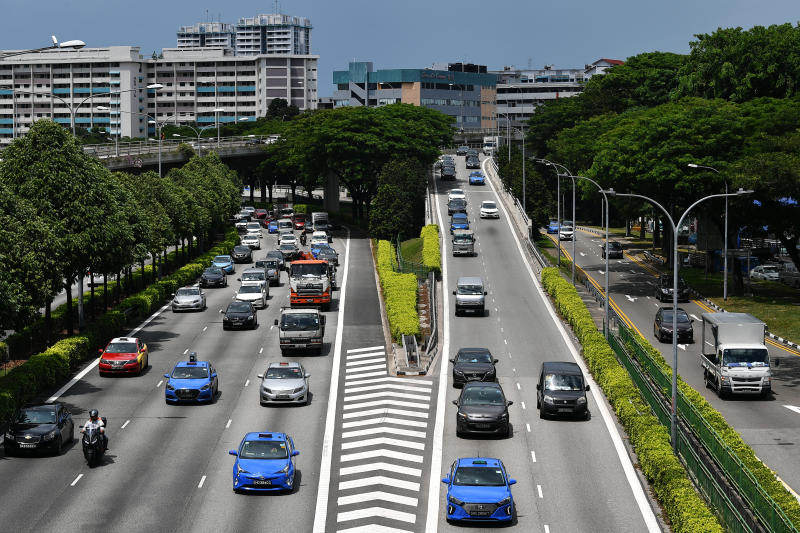Parliament: Motorists to face stiffer penalties for dangerous and careless driving
Sign up now: Get ST's newsletters delivered to your inbox

Irresponsible driving offences, which were previously dealt with under the Road Traffic Act (RTA) and the Penal Code, will now be consolidated under the RTA, specifically into two classes: dangerous and careless driving.
ST PHOTO: LIM YAOHUI
SINGAPORE - Motorists convicted of irresponsible driving offences can expect possibly longer jail terms and heftier fines under enhancements to the Road Traffic Act passed in Parliament on Monday (July 8).
For instance, a first-time offender convicted of causing death by dangerous driving will face up to eight years in jail, three years more than the maximum provision under current laws, as well as a minimum disqualification period of 10 years.
Serious and repeat offenders also face the prospect of being suspended from driving immediately, said Mrs Josephine Teo, Second Minister for Home Affairs, during the debate in Parliament over the proposed changes to the law.
Tougher measures are needed, as "irresponsible driving remains a big concern" and "can have deadly consequences", said Mrs Teo as she recounted a couple of recent cases.
"These are heart-wrenching tragedies that could been avoided. Enforcement, education and road safety infrastructure must certainly continue to be improved. But we also need stronger deterrence against irresponsible driving," she added.
The current penalties are "manifestly inadequate", said the minister, pointing out the need to raise "sentencing norms for egregious irresponsible driving offences", especially those that result in death or permanent disability.
Mrs Teo cited how the United Kingdom and Hong Kong punish offenders who cause death by dangerous driving with a maximum jail term of 14 years and 10 years respectively.
Irresponsible driving offences, which were previously dealt with under the Road Traffic Act (RTA) and the Penal Code, will now be consolidated under the RTA, specifically into two classes: dangerous and careless driving.
And three factors will decide which class an offence belongs to.
One, the manner in which a motorist operates his vehicle puts others at risk or unable to react, like driving against the flow of traffic or swerving across lanes without warning.
Two, behaviour that can be considered dangerous is when a motorist drives a vehicle despite knowing he is not in any condition to drive safely, like using his mobile devices while driving or failing to use his spectacles when he is short-sighted.
Three, failing to take extra precaution or slow down when a motorist approaches a zebra crossing.
"When determining the punishment, we will look at the circumstances under which the offence is committed," said Mrs Teo. "The threshold for dangerous driving is higher than careless driving. So, too, the penalties."
With the enhanced law, the duration of the sentences will depend on the extent of harm caused, with death being the most severe, followed by grievous hurt, hurt and endangering life.
For instance, repeat offenders who drive dangerously causing death will face a maximum of 15 years' in jail - compared to five years' jail for a second offence presently.
In addition, a first-time or repeat offender faces the prospect of being suspended from driving immediately and having to forfeit his vehicle, as well as being disqualified from driving for 10 years.
The most severe penalties are imposed on those driving under the influence (DUI) - one of the biggest contributors to serious accidents on Singapore roads, said Mrs Teo.
Such offenders convicted in cases involving death can face a maximum jail term of 10 years, including a minimum disqualification period of at least 12 years.
Repeat offenders can be jailed for up to 19 years and disqualified from driving for the rest of their lives.
"Drivers who are drunk or drug-impaired show a blatant disregard for the safety of other road users... These are also accidents that could have been avoided, if most motorists had not come under influence or did not drive," she added.
Mrs Teo also said the courts and the Traffic Police (TP) will be given the discretion to use "additional levers" to quickly remove irresponsible drivers from our roads.
The TP will have the powers to impose immediate suspension for all dangerous and careless driving offences, including DUI, that result in death or grievous hurt.
Currently, "these motorists can continue to drive until such time that they are convicted", the minister noted.
There are exceptions, however.
Said Mrs Teo: "In exceptional circumstances, such as where the motorist committed the offence while rushing for a medical emergency, the courts will have the discretion not to apply the minimum disqualification period."
Similarly, the courts may decide against the forfeiture of a vehicle involved in a serious accident if the offender is not the vehicle owner and had driven the vehicle without the owner's consent.


